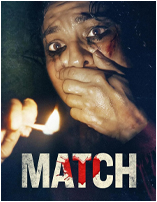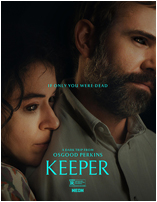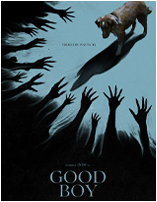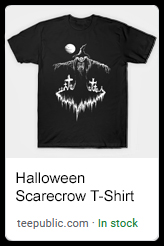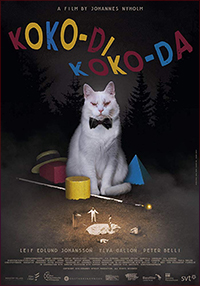 A couple (Elin and Tobias) is on a vacation with their young daughter (Maja), when a serious case of food-poisoning causes the mother to become very ill. She is rushed to the hospital, and the whole family is spending the night in the hospital room, awaiting the mother’s recovery. When the next day arrives, which is also Maja’s birthday, they discover that she has died overnight due to a delayed response to the food poisoning. A few years later, the couple is going on a trip in order to find their way back to each other, but eventually find themselves trapped in a never-ending loop of terror when they are attacked by a trio of terrifying characters resembling the cartoons on their dead daughter’s music box.
A couple (Elin and Tobias) is on a vacation with their young daughter (Maja), when a serious case of food-poisoning causes the mother to become very ill. She is rushed to the hospital, and the whole family is spending the night in the hospital room, awaiting the mother’s recovery. When the next day arrives, which is also Maja’s birthday, they discover that she has died overnight due to a delayed response to the food poisoning. A few years later, the couple is going on a trip in order to find their way back to each other, but eventually find themselves trapped in a never-ending loop of terror when they are attacked by a trio of terrifying characters resembling the cartoons on their dead daughter’s music box.
Koki-di Koko-da by Johannes Nyholm is told like a nihilistic fable about loss and grief. The title is based on a French nursery rhyme, Le coq est mort (The rooster is dead, or Vår tupp är dö which is the Swedish version of the song). This song is sung by the only vocal character among the villains, and is also heard several other places throughout the movie. The atmosphere in the entire movie is somewhat tense already from the get-go, showing us that the death of their daughter has put such a strain on their relationship that they bicker at each other for every little trivial thing (like buying an ice cream with a different flavor). Setting up their tent in the woods at night, the couple is then attacked by the strange trio who also bring with them an aggressive dog. Elin goes out to take a pee, and sees a white cat (the cat having a different role in their story than the trio of weirdos, which is revealed later). When she is attacked, her husband Tobias just watches what unfolds from the tent, until it’s his turn to face their tormentors. And so it keeps repeating in a cycle of death and despair.
While we have had a couple of “Groundhog Day” type of horror movies recently (Happy Death Day, In The Tall Grass), this movie differs in how the time-loop never seem to make the characters any wiser or more prepared to face their fate. They get jumpier and more scared, but there is no “a-ha” moment in any of them, and Tobias is constantly cowering while his wife keeps getting brutalized and killed. The cartoony villains add to the bizarre and helpless atmosphere, giving it both a gloomy and weirdly funny tone. The animated sequences in the movie, consisting of shadow puppets which are moved along the screen with strings, are also a great element which ties together the rest. They show a “bunny family” representing the grieving parents and how they (ultimately) end up dealing with the loss of their daughter in ways that inevitably keeps them from progressing any further from their self-loathing and depression.
Koki-di Koko-da is an artistic horror movie which centers around grief and loss, and it’s definitely not aimed to be a crowd-pleaser. It’s not very straight-forward, and is not providing any clear goal for our protagonists (although there’s symbolism and metaphors all over the place). It’s like a twisted and dark fairytale that isn’t made with the intentions of tucking you off to bed with a good feeling.

Director: Johannes Nyholm
Country & year: Sweden | Denmark, 2019
Actors: Peter Belli, Leif Edlund, Ylva Gallon, Katarina Jakobson, Morad Baloo Khatchadorian, Brandy Litmanen
IMDb: www.imdb.com/title/tt9355200/
![]()



